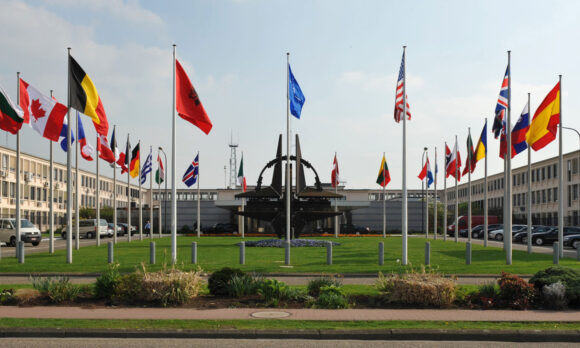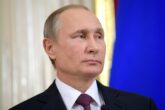July 17, 2024
Sharper: NATO Summit
Analysis from CNAS experts on the most critical challenges for U.S. foreign policy.
The 75th NATO Summit was held in Washington DC, last week, and brought together leaders and governments to discuss pressing issues facing the world's oldest alliance. A bridge to Ukraine membership, military production, and official communiques on the challenge China poses to the alliance were just some of the topics. CNAS experts held panels and conversations alongside the summit during the Public Forum to discuss these issues and more. Read the latest edition of Sharper to explore their ideas and analysis on the future of NATO.
Features
NATO Public Forum
The NATO Public Forum is the public facing arm of the summit that takes place alongside official meetings. The Public Forum aims to promote better public understanding of NATO’s policies, goals, and decision-making process through dialogue and engagement with leaders, experts, and new voices. This year the NATO Public Forum was cohosted by CNAS, the Atlantic Council, GLOBSEC, the German Marshall Fund of the United States, and the Hudson Institute in collaboration with NATO and the U.S. State Department. Rewatch all the sessions from this two-day event.
For Freedom and For Peace, NATO 75
CNAS and the Truman Library Institute hosted an event at the National Archives to mark NATO’s 75 anniversary and President Truman’s role in the alliance’s founding. Keynote speakers Admiral Rob Bauer and General Charles Q. Brown Jr. discussed the alliance's visionary past and the future of transatlantic cooperation.
NATO Public Forum
Jul 10 – 11, 2024
For Freedom and For Peace, NATO 75
Jul 11, 2024
Adapting NATO's Nuclear Posture to Current Threats
NATO representatives gathered in DC last week for discussions largely focused on how the alliance can continue to support Ukraine against the ongoing Russian invasion. Join CNAS on Friday, July 19, at 10:30 a.m. ET for a virtual fireside chat with Dr. Vipin Narang, acting assistant secretary of Defense for Space Policy and Dr. Stacie Pettyjohn, director of the Defense Program. The conversation will broadly discuss how NATO’s nuclear posture is evolving in response to Russia’s repeated threats to use nuclear weapons.
Kurt Volker and Douglas Lute Discuss the Upcoming NATO Washington Summit
This episode was released on July 5, ahead of the summit. Though the 75th NATO Summit was in part a celebration of the alliance’s enduring success, it also comes at a time when NATO is grappling with numerous challenges. The most pressing issue is of course Ukraine, as NATO members will need to continue to work together to provide Kyiv with support in its efforts to fight off Russia’s invasion. Beyond Ukraine, NATO must navigate the ongoing modernization of its defense and deterrence plans, the increasing risk of hybrid attacks from Russia, the transition to a new secretary general, and much more. Douglas Lute and Kurt Volker joined Andrea Kendall-Taylor and Jim Townsend on this week’s episode of Brussels Sprouts to discuss the Summit.
Virtual Event | Adapting NATO's Nuclear Posture to Current Threats
Jul 19, 2024
Kurt Volker and Douglas Lute Discuss the Upcoming NATO Washington Summit
From July 9th to 11th, NATO will hold its historic 75th-anniversary summit in Washington, DC. On the sidelines, CNAS and other think tanks will host the NATO Public Forum. Tho...
Commentaries
For Putin, the EU Is a Bigger Threat Than NATO
“It is the EU, not NATO, that presents the real existential threat to the Kremlin,” argue Nick Lokker and Kate Johnston for Foreign Policy. “That’s because Ukraine’s membership in and integration into the EU could deliver a fatal blow to Russian President Vladimir Putin and his regime by turning Ukraine into what Russia most fears: a political, economic, and sociocultural alternative to Russia itself. Although Putin’s popularity among Russians remains high, the Kremlin could very well worry that Russian citizens may begin to see the benefits of EU membership across the border and desire an alternative future for their country.”
NATO’s Missing Pillar
“Strengthening the European pillar of NATO is the clear answer to the continent’s security problem,” write Jim Townsend, Sean Monaghan, and Mathieu Droin for Foreign Affairs. “Yet for 25 years, the United States has been reluctant to support a larger European role within the alliance. Even as Washington urged its European allies to spend more on defense, U.S. leaders were loath to surrender the reins of transatlantic security. It is now time for that mindset to change. When allied leaders meet in Washington for NATO’s 75th anniversary summit in July, they should commit to fortifying European defense. Europe needs to invest more money to improve its military capabilities and combat power, and to get better at coordinating the efforts of individual countries. The United States must encourage such a transformation, not get in its way—and the European Union should help, too. Without a stronger European pillar of NATO, Russia will continue to threaten transatlantic security and the United States will be unable to focus its resources on China.”
NATO and the EU Need to Get Real on Ukrainian Membership
“Despite the Pentagon’s continued pledges to expand inventories of key conventional weapons, munitions continue to lose in budget battles to larger platforms,” observes Nick Lokker for Inkstick. “But these ships, submarines, aircraft, and guns will be worthless without the missiles, torpedoes, and bullets to arm them. Even in today’s constrained budget environment, the U.S. Defense Department needs to do more to prioritize munitions buys and prove it has learned the lessons of Ukraine. Congress can play a role in holding the Pentagon to its word here, increasing the buys of key conventional weapons as well as authorizing and appropriating money for the multiyear munitions contracts that would give much-needed stability to the munitions industry.”
For Putin, the EU Is a Bigger Threat Than NATO
Russia, by aiming to prevent the EU’s enlargement and impose its own control over Ukraine, Moldova, and Georgia, is on a campaign to reassert its imperial idea in Europe....
NATO’s Missing Pillar
It is commonly assumed that NATO was built on U.S. power, but in fact the commitment to collective security emerged in Europe first....
NATO and the EU Need to Get Real on Ukrainian Membership
At NATO’s landmark 75th anniversary summit in Washington, a key issue on the agenda will be the nature of the alliance’s commitment to Ukraine’s future membership. Following v...
In the News
Commentary and analysis from Andrea Kendall-Taylor, Jim Townsend, and Lisa Curtis.
U.S. officials warn of Russia's sabotage operations in Europe
NPR’s Scott Simon speaks with national security expert, Andrea Kendall-Taylor, after officials warn that Russia is stepping up a campaign of covert sabotage across Europe. Li...
NATO Leaders Move to ‘Trump-Proof’ the Alliance in Washington
Fears that the former president could soon be back in the White House have NATO leaders looking to lock in support for Ukraine — and the alliance itself....
How Can Europe Reduce Its Military Dependency on the United States?
“European armies are too small to handle even the arms that they’ve got now,” said Jim Townsend, a former U.S. assistant secretary of defense now at the Center for a New Ameri...
Air defence package for Ukraine could work alongside F-16s to halt Putin's attacks
Jim Townsend joins Frontline on Times Radio to discuss how further U.S. air defense systems for Ukraine and Nato drills will be key to sending a message that Nato is committed...
Biden Administration Disturbed by Modi-Putin Visit During NATO Summit
This week, Russian officials and state media appeared to revel in Modi’s visit. Dmitry Peskov, the Kremlin spokesman, said Western governments were “jealous — that is why they...
About the Sharper Series
The CNAS Sharper series features curated analysis and commentary from CNAS experts on the most critical challenges in U.S. foreign policy. From the future of America's relationship with China to the state of U.S. sanctions policy and more, each collection draws on the reports, interviews, and other commentaries produced by experts across the Center to explore how America can strengthen its competitive edge.
Subscribe
Sign up to receive the latest analysis from the CNAS expert community on the most important issues facing America's national security.
Thank you for registering! You will receive a confirmation email shortly. All CNAS events are free, open to the public, and viewable from cnas.org/live.
Stay up-to-date with report releases, events, major updates, and announcements from the Center for a New American Security.
More from CNAS
-
The Hidden Past and Uncertain Future of the U.S. and Ukraine with Celeste Wallander
Under the Trump administration, U.S. support for Ukraine is no longer guaranteed. President Trump's pause on aid and intelligence to Ukraine in March may have been brief, but ...
By Andrea Kendall-Taylor, Jim Townsend & Celeste Wallander
-
Is Russia Under Pressure?
Since 2014, the United States and its allies have provided increasing military support to Ukraine while imposing more and tougher economic sanctions on Russia, especially sinc...
By Jeffrey Edmonds
-
Europe's Trade War Woes
On April 2nd, President Trump imposed sweeping tariffs across the globe – with only a handful of countries left untouched. The EU was hit with tariffs of 20% and the European ...
By Andrea Kendall-Taylor & Jim Townsend
-
Will Donald Trump Take Greenland by Force?
Trump’s comments have raised alarms in Greenland, particularly after US Vice President JD Vance announced he would visit the island. Greenland is rich in minerals, and it’s st...
By Jim Townsend















